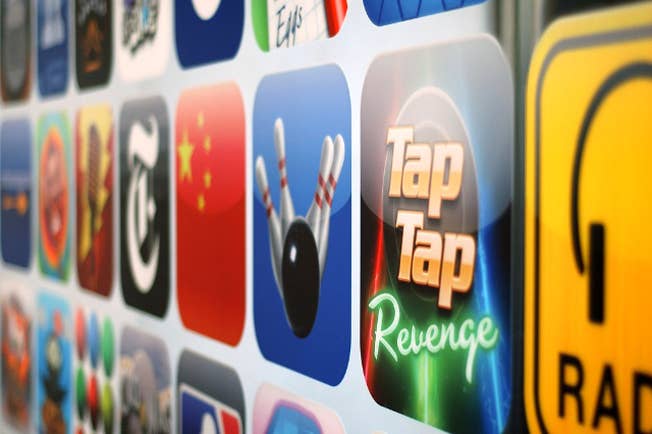Mobile Gaming: "The Relationship Between Developer and Publisher Has Changed Forever"
Mobile developers react to Trip Hawkins' assertions about app store economics and the role of publishers
Trip Hawkins, CEO of Digital Chocolate, recently commented on the crowded state of app stores, begrudging the store owners their 30 percent cut and noting that publishers will be increasingly needed to help mobile developers stand out from the pack. GamesIndustry International spoke with several mobile developers, and their responses on the matter were interestingly mixed.
There are about 75,000 games on Apple's App Store currently, and getting noticed is indeed difficult. EA CEO John Riccitiello would no doubt agree with EA founder Hawkins' assessment, and would certainly love to see more innovative developers partner with EA Mobile.
Ernest Woo, founder and CTO of Woo Games, agrees that in today's mobile marketplace publishers are becoming a necessity.
"Most developers treat that part of the process as an afterthought with the misconception 'if I realize something of quality, the audience will surely find it and it will be a success' but of course this is seldom reality"
Ron Alpert
"I agree that app stores are the digital equivalent of a retail storefront - they are not responsible for helping a user discover any particular app out there. I caution developers in clinging to the naive view that selling an app in 2012 is exactly like selling an app in 2009. The market is just too crowded. The app stores need a filter that they cannot provide - that's where publishers come in," he said.
William Volk, PlayScreen CCO, on the other hand, doesn't really buy into the publisher argument.
"Do iOS users really care who the publisher is? What examples are out there of a game succeeding because of who published it? Instead I see titles like Ski Safari hitting top ranks on the basis of being a simple and beautiful game with awesome playability," he said. "No one knew who the publisher Defiant Development was, and their prior title Rocket Bunnies never broke into the top 500. Ski Safari is sitting pretty in the top 10 right now. Yes, a publisher can add great value in terms of understanding the market, providing suggestions and getting folks to know about the title. It still doesn't change the fact that this is a title-driven business."

Graeme Devine, GRL Games Co-founder & CEO, didn't weigh in on the publisher issue, but he does not agree with those who place blame on the app storefronts.
"I think that's kind of like saying there's a million websites, or a million books, or a million ideas. You don't blame the box that holds them all, you need to look and think outside the box to get people excited to come to you," he remarked.
Indeed, Ron Alpert, Headcase Games Co-founder, argues that the cut Google or Apple takes is totally fair considering that they have to host all the games and maintain some sort of quality for mobile consumers. On the publishers issue, he does largely agree with Hawkins, noting that most developers are clueless about getting their games exposure.
"First of all, I don't take issue with app store owners (Apple, Google, Amazon, etc) taking a cut of my profits; 30 percent is a fair share for what they provide (bandwidth, some degree of quality control, potential for visibility, among many other features)," he stated. "As for discovery on app stores, it's been the case for years now that app developers need to strongly consider the how's and why's of marketability in order for their products to stand any kind of chance for visibility and potential success. Even now, most developers treat that part of the process as an afterthought with the misconception 'if I realize something of quality, the audience will surely find it and it will be a success' but of course this is seldom reality."
"The relationship between developer and publisher has changed forever... publishing partnerships and acquisitions will have to be much more even-handed"
Chris Ulm
Alpert continued, "As most smaller developers are therefore inconsiderate or misinformed about this very important element of the development process, many would do well to team up with a publisher or dedicated marketing/promotion team to better raise their products' visibility; otherwise app development is really just throwing too much to chance, and many smaller outfits nowadays are finding it to be a waste of time and money."
Chris Ulm, Appy Entertainment CEO, ultimately sees big changes in the mobile market, but in terms of the role of publishers going forward, Ulm believes that they'll have to relinquish more power to the developers if they still want to be involved.
"There are several trends which will hasten the consolidation of the mobile game market. As Trip Hawkins has pointed out, discovery and user acquisition is getting more and more difficult and companies that are good at this will inevitably need high quality content, which will increasingly become attractive for high quality independents. Development costs are also rising, so If you are a real company with employees and payroll, deals that preserve some upside but limit the downside risk will become the norm," he said.
"I do believe, however, that the relationship between developer and publisher has changed forever. Many mobile developers have the experience of self-publishing - publishing partnerships and acquisitions will have to be much more even-handed because app developers intimately understand the business side and know how to design for it. This will make mobile developers more demanding but also much better partners in creating successful games that have great user experiences and are able to make money once discovered."

